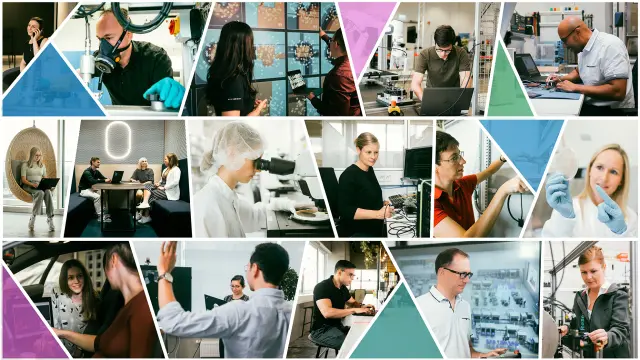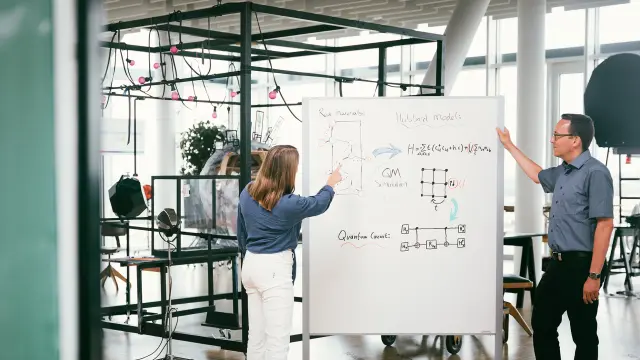Top-level research for Bosch
At Bosch Research, around 1,800 experts research the technologies for the Bosch products of tomorrow and beyond.
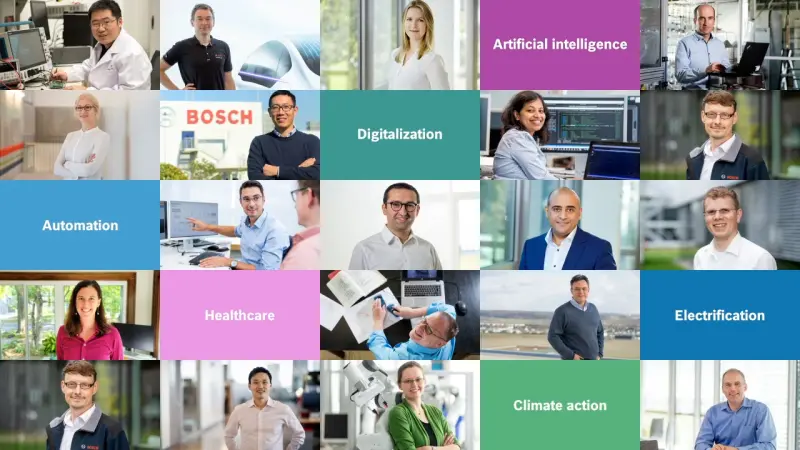
Creating technology for life and thus products that make life better — that is Bosch’s aim. At Bosch Research, we do the groundwork for this. As the central point of contact for technological innovations, we work with the business units to develop the next generation of Bosch products — and the one after that. At the same time, we identify key technologies of the future and make them usable for Bosch. Researchers at Bosch Research also analyze geopolitical, social, economic and technological megatrends that will shape the world of tomorrow — thus safeguarding Bosch's technological future viability. At Bosch Research, research work is never an end in itself: in keeping with the spirit of our group founder Robert Bosch, it should create added value for people while protecting our natural resources.
First class: our experts at Bosch Research
We have around 1,800 experts who are largely responsible for the success of Bosch Research. From physicists and electrochemists to software developers: we rely on the expertise and ideas of our employees to meet the challenges of the future. They are part of a diverse international team that works closely together at nine locations in six countries. Focusing on a wide range of disciplines, they constantly push the boundaries of what is technologically feasible. Bosch Research also serves as an ideal entry point for highly specialized professionals at Bosch as a whole. After all, their path often leads them from the academic world via Bosch Research into one of the Group's many business areas. Get to know our research experts here.
Innovation and entrepreneurship: the management at Bosch Research
The management at Bosch Research is known for its spirit of research and entrepreneurial way of thinking. We focus equally on long-term basic research and product-related advance development. Making decisions together and sharing responsibility is particularly important here. Talking to our partners is just as important as mutual support and cooperation — the “how” and the “what” go hand in hand at Bosch Research.
Dr. Udo-Martin Gómez
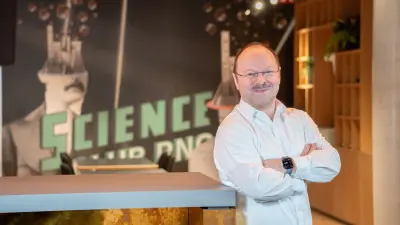
Dr. Udo-Martin Gómez has been in charge of Bosch Research since 2025. With a doctorate in physics, he started his more than 25-year career at Bosch in 1999 in the field of microstructure technology at Bosch Research. This was followed by specialist and management roles in the Automotive Electronics division and at the headquarters of Robert Bosch GmbH, most recently as Executive Vice President Strategy, Organization and Business Development, before he joined the management of Bosch Research in 2024. “Our applied research bridges the gap between science and industry”, says Gomez. “The experts at Bosch Research are already working around the world to find technological solutions for tomorrow's challenges and are supporting the Bosch divisions in product development. This makes Bosch Research an ideal place for researchers to use their innovations and ideas to develop technologies for a better life. With our close ties to academia worldwide, we are not only Bosch's source of innovation, but also its talent factory.”
Dr. Michael Kessler
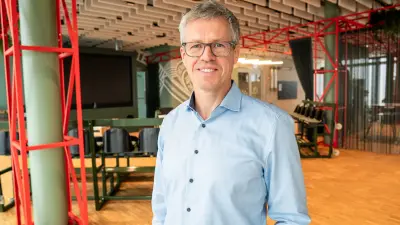
Dr. Michael Kessler joined the management of Bosch Research in 2025. He focuses on AI research, application and industrialization, software and communication technologies as well as automation in mobility. In addition, he manages the Renningen site. He started at Bosch in 2002 in software development and application for control units. After holding various management roles, Michael Kessler became Senior Vice President for Digital and AI solutions at Bosch Corporate Research in 2021. “Artificial intelligence is a key competence and an innovation booster for many applications — not just for the future, but already today. That's why we at Bosch Research have been conducting intensive, cross-domain research into AI solutions for years, for use in development, manufacturing, and Bosch products.”
Scientific know-how and global partnerships
At Bosch Research, we concentrate on six key areas: automation, digitalization and connectivity, artificial intelligence, electrification, climate action and sustainability and healthcare. The focus is on researching and developing new technologies and concepts to support the Bosch divisions in product development. Each of the nine research sites specializes in those research fields that match the scientific and technological profile of the particular region and the local Bosch divisions. The fact that the business units are heavily involved in our research projects allows close cooperation from basic research through to product development. You will find details of the Bosch Research sites here.

Our employees’ performance speaks for itself: our experts are directly involved in around a quarter of the patent applications filed by Bosch each year. Every year, they publish around 1,000 articles in well-known scientific magazines and make appearances at international conferences.
To take advantage of the many ideas that come about outside Bosch, Bosch Research cooperates with some 50 world-class scientific institutions. Partners include top universities such as Carnegie Mellon University and University of California in the USA, Tsinghua University in China and the Technical University of Munich in Germany. We work together in various ways — from joint supervision of doctoral students to extensive research projects, some of which are publicly funded.
Thinking technology and business models together
At Bosch, science and entrepreneurial activities go hand in hand. One example is Bosch Business Innovations, our internal start-up incubator. With its global “Home for Bosch Intrapreneurs”, Bosch Business Innovations is a place where ambitious employees are given decision-making freedom, business responsibility and direct access to financial resources and business know-how. Intrapreneurs develop and establish new, globally active business areas for Bosch. Working closely with research, they ensure that scientific findings and technologies are taken into account in new products and business models.
Another key area at Bosch Research is research into artificial intelligence (AI). The Bosch Center for Artificial Intelligence (BCAI) is a network of experts from Bosch Research and the business divisions. Here, experts come up with new ideas allowing Bosch to use artificial intelligence in virtually every product and technological development.
